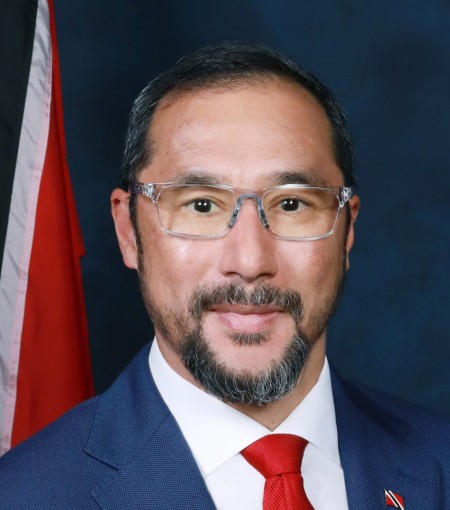PORT OF SPAIN, Trinidad – Two former high-ranking government officials have warned the Kamla Persad-Bissessar administration to dial back on threats to use deadly force against unidentified vessels entering Trinidad and Tobago’s waters from Venezuela, with one describing the approach as “borderline insanity.”
 Former prime minister Stuart Young strongly criticized the policy, describing it as irresponsible given the geographic proximity and economic interdependence between the two nations.
Former prime minister Stuart Young strongly criticized the policy, describing it as irresponsible given the geographic proximity and economic interdependence between the two nations.
Venezuela, through its Justice Minister Diosdado Cabello, has claimed that a Trinidadian national had been captured while travelling to Venezuela with a group labelled as “terrorists” attempting to destabilise the Venezuelan government. Cabello alleged that Trinidad and Tobago had become a “launchpad” for mercenaries and provocateurs targeting Venezuela.
In response, Prime Minister Persad-Bissessar said her government had no evidence to validate the claims made by Venezuelan officials. She described the threats as politically motivated and warned that any incursion into Trinidad and Tobago territory would be taken seriously.
“I will speak to the Minister of Defence and the Attorney General to seek advice on protections for our Coast Guard to use deadly force on any unidentified vessel entering T&T waters from Venezuela,” she declared.
Young, who briefly served as prime minister from March to May after Dr Keith Rowley stepped down from office, described Persad-Bissessar’s stance as reckless.
“Venezuela is seven miles off of the coast of Trinidad and Tobago and is our closest geographical neighbor,” he said in a social media post. “It is the height of irresponsibility and, arguably, borderline insanity, for our government, led by none other than the Prime Minister Mrs Kamla Persad-Bissessar, to declare a use of deadly force policy on any unidentified vessel entering Trinidad and Tobago’s waters from Venezuela.”
“I call upon the government to engage in proper diplomatic communications with Venezuela and to appreciate that as the government you have to act responsibly and judiciously.”
He said Persad-Bissessar’s current stance ignores the longstanding challenges of monitoring marine traffic and could lead to tragic consequences.
“As has happened on many occasions in the past, our radar system may fail to pick up marine vessels entering and leaving our waters. This is nothing new,” Young noted. “The ocean expanse is vast and there are reports of numerous vessels entering and leaving Trinidad and Tobago’s waters. In fact, it is the same UNC [United National Congress, the PM’s political party] that used to scream in opposition about our porous borders. So to now pretend that you can conclusively determine whether a vessel left Trinidad and Tobago destined for Venezuela with persons onboard is simply not true.”
Young accused the government of resorting to “false bravado” rather than engaging in serious diplomacy and warned that the consequences could extend far beyond border security.
He pointed specifically to the Manatee gas field, part of the cross-border Loran-Manatee development with Venezuela, as an example of what is at stake. Young, also a former energy minister, urged to administration to “quickly appreciate that our future financial stability and energy security is directly tied to Venezuela…. What happens if Venezuela decides now to cancel this arrangement? It would lead to financial disaster for Trinidad and Tobago.”
“This government needs to wake up and stop jeopardizing our future and our country’s reputation,” he urged.
Former national security minister Gary Griffith echoed concerns about the implications of Persad-Bissessar’s warning, while acknowledging her willingness to stand firm in the face of external pressure.
“It is commendable that the Prime Minister has taken a firm stance in refusing to let Trinidad and Tobago be bullied. But strength is not just about words. It’s about foresight, capability, and leadership,” he stated in a post on Facebook.
Griffith stressed that any strong response must be grounded in realism and backed by proper security infrastructure. He noted that Venezuela possesses military vessels with superior range and firepower, while T&T’s coast guard fleet has been left vulnerable due to poor maintenance and underinvestment.
“In any hypothetical maritime confrontation, Venezuela has a clear tactical advantage,” he said. “The idea that we could stand toe-to-toe in the Gulf is not just unrealistic—it is dangerous.”
He added that his previous efforts as national security minister led to a de-escalation of similar maritime disputes through sustained engagement rather than confrontation: “We didn’t respond with threats—we responded with diplomacy, and through sustained dialogue, we established a bilateral agreement which led to those incursions stopping. A win for both countries involved.”
Griffith further warned that the current approach could escalate tensions unnecessarily, especially given the nation’s present lack of defensive capacity: “A misstep here could set off a domino effect: from posturing, to pushing, to provocation, to violence.”
While supportive of a firm stance against foreign intimidation, Griffith maintained that diplomacy must be the Government’s first and most deliberate step.
“Let us act wisely—before perception turns into escalation,” he said.
Former prime minister Dr Keith Rowley had also reacted to Persad-Bissessar’s comments last Thursday, the same day she made them.
“To throw down a deadly force gauntlet to Venezuela can only be viewed as powerful stupid and an unnecessary burning of our bridges with a friendly neighbor, in a thinly veiled attempt to curry favor abroad.
“What happened to standard diplomacy, fact finding and common sense in handling sensitive matters of this nature?” Rowley asked, noting that the fact that Trinidad has “no information about insurgents or any bad actors using our territory against another is no basis to be so belligerently dismissive of any allegations made by any of our neighbors. Ignorance is never a solid basis on which to approach any issue”.


